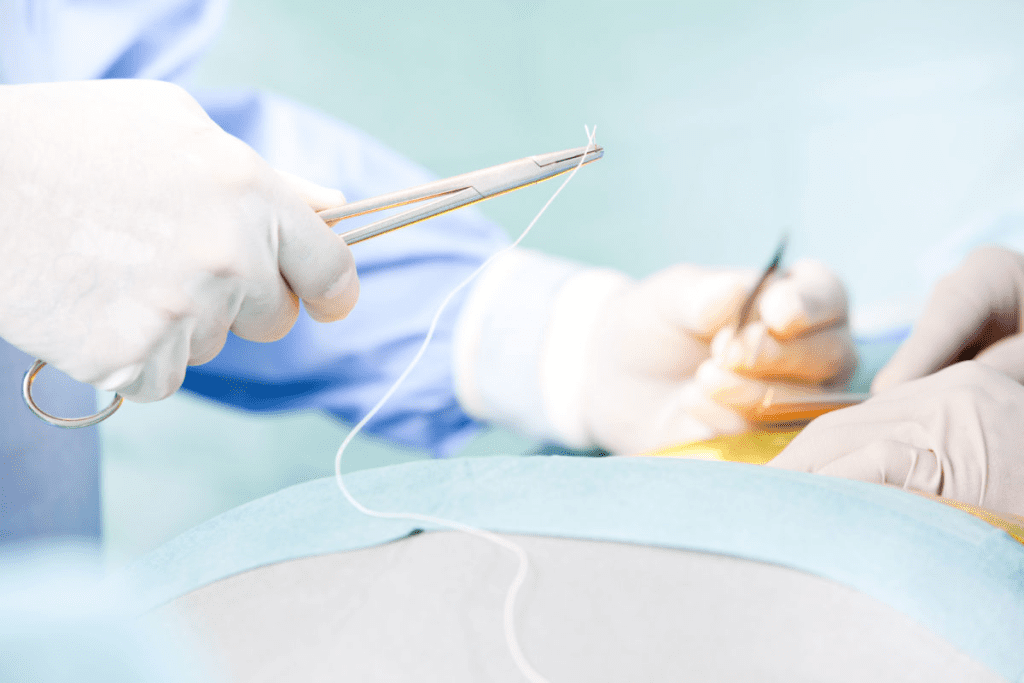Last Updated on October 31, 2025 by

Not treating a stricture can cause serious health problems. A stricture is a narrowing of the urethra due to scar tissue. To define stricture clearly, it is any abnormal tightening in a tube or passage in the body that can block normal flow. It can make you feel uncomfortable and affect your daily activities.
If you don’t get treatment, urethral stricture disease can get worse. This can lead to problems like not being able to urinate, bladder infections, kidney damage, or bladder stones. It’s very important to see a doctor to avoid serious damage and get the right treatment.
A stricture is a narrowing of a body passage. It can happen in different parts of the body. This can lead to various health problems, depending on where it is and how severe it is.
A stricture is made of scar tissue that narrows a passage. For example, a urethral stricture narrows the urethra, making it hard to urinate. A bowel stricture or colon stricture narrows the intestine, causing blockages.

There are many reasons why strictures form. They can be caused by medical procedures, inflammation, or trauma. Iatrogenic causes come from medical mistakes. Inflammation and trauma damage tissues, leading to strictures.
Strictures often affect the urinary and gastrointestinal systems. In the urinary system, urethral strictures can cause trouble urinating. In the gut, strictures can block food or cause pain. Cecum pain is a symptom of strictures in the gut.
Knowing about strictures helps doctors catch them early. This can prevent serious problems that happen if they are not treated.
Early signs of untreated strictures are often subtle but can lead to serious health issues if ignored. It’s important to recognize these signs to act quickly.
Strictures in the digestive system can cause various symptoms. If you notice any of these, it’s vital to see a doctor:
These symptoms might mean a bowel obstruction or other stricture-related issues. For example, sigmoid flexure pain could point to a stricture in the sigmoid colon.

While some symptoms can be managed, others need immediate medical help. If you have:
Go to the emergency room right away. These signs can mean a complete bowel obstruction or other serious problems. Knowing how to tell if you have a bowel obstruction can prevent severe outcomes.
Early detection and treatment can greatly improve outcomes for stricture patients. Stay alert to your body’s warning signs and talk to a healthcare professional if you’re worried.
Untreated strictures can cause serious short-term problems. These issues can greatly affect a person’s quality of life. They can lead to a series of health problems that need quick medical help.
One major issue is acute urinary retention, seen in about 60% of cases. It’s when you suddenly can’t urinate. This can be very painful and might harm your urinary tract.
It’s a medical emergency that needs fast action. If symptoms don’t get better or get worse, seek help right away.
Prostatitis and other infections affect about 50% of those with untreated strictures. These infections can make the prostate gland inflamed. This leads to pain, swelling, and trouble urinating.
It’s key to treat strictures quickly to avoid these infections. They can really hurt your health and well-being.
Bladder hypertrophy, or thickening of the bladder wall, happens in up to 85% of cases. It’s because the bladder works too hard to get past the stricture. This can make the bladder muscles thick and might cause lasting damage.
We stress the need to treat strictures early. This can stop bladder hypertrophy and other problems from long-term blockages.
The numbers show why it’s important to see a doctor if stricturing symptoms don’t go away or get worse. Early treatment can stop these problems and help patients get better.
As strictures get worse, the risk of serious problems grows. Untreated stricture disease can cause many health issues. These issues can lower your quality of life and threaten your health.
Epididymo-orchitis is a painful inflammation of the epididymis and testicles. It happens in about 25% of untreated stricture cases. This condition can come from a bacterial infection spreading from the urethra.
If you have testicular pain, swelling, or fever, see a doctor right away. For more info on epididymo-orchitis, check out NCBI’s resource on the topic.
In about 20% of cases, untreated strictures can cause hydronephrosis. This is when a kidney swells up because urine can’t flow out. It can cause permanent kidney damage if not treated early.
We stress the importance of early treatment to avoid such problems.
Periurethral abscesses form in about 15% of cases. They are pockets of pus around the urethra, often from infection. These abscesses can be very painful and may lead to more problems if not treated quickly.
We urge patients to get medical help right away for such conditions.
Stricture disease can cause stones in the bladder and urethra in about 10% of cases. These stones can block urine flow, cause infections, and be very uncomfortable. We advise patients to watch for symptoms and seek medical help if they don’t go away.
In conclusion, strictured disease can lead to serious complications. These complications can harm your health and quality of life. We strongly recommend getting medical help early to avoid these problems and get the best care possible.
Untreated strictures can lead to serious health problems. These include infections and damage to organs. If strictures are not treated, they can cause many complications.
Untreated strictures can cause systemic infections. The stricture blocks the flow of fluids, allowing bacteria to grow. This can spread infections through the blood, affecting many organs and being life-threatening.
Strictures in the urinary tract can cause kidney failure if not treated. The buildup of urine can damage the kidneys permanently. This can lead to chronic kidney disease or the need for dialysis.
Bowel strictures can lead to a ruptured colon. This is a serious issue that can cause peritonitis, an infection of the abdominal cavity. It’s a medical emergency that needs immediate surgery.
Seeking medical help is key if symptoms of stricture get worse. Early treatment can prevent severe problems. It can also improve the quality of life for those with strictures.
Chronic strictures affect more than just physical health. They can change many parts of a person’s life. For example, chronic urethral stricture disease can really impact a patient’s quality of life. It causes many problems that make daily life hard.
Chronic strictures often lead to chronic voiding dysfunction. This makes urination hard, urine flow weak, and the bladder not empty fully. These symptoms can be very upsetting and need constant care.
People with chronic strictures are more likely to get UTIs again and again. These infections are painful and uncomfortable. If not treated, they can cause even bigger problems. It’s important to know the signs of UTIs, like burning while urinating or needing to go a lot.
Untreated chronic strictures can deeply affect a person’s mind. The ongoing pain and issues can cause anxiety, depression, and a lower quality of life. Healthcare providers should help with these mental health issues, too.
Chronic strictures make everyday tasks hard. Simple things like going to the bathroom or doing activities can be tough. The fear of more problems or needing constant medical help also limits what people can do. This affects their happiness and well-being.
It’s key for both patients and doctors to understand these effects. By knowing how chronic strictures impact life, we can offer better care. This care should help with both the physical and mental sides of the condition.
It’s key to know what strictures are and how they happen. A stricture is when a body passage, like the urethra or intestine, gets too narrow. This can cause big problems if not treated.
Acting fast is vital to stop serious issues from strictures. Treatments like strictureplasty can help ease symptoms and make life better for patients. Intestinal stenosis, or narrowing of the intestine, also needs quick medical help to avoid serious problems.
We stress the need to see a doctor if symptoms don’t go away or get worse. This way, people can avoid serious complications from untreated strictures. It helps ensure a better life and prevents severe long-term effects.
A stricture is a narrowing in a body passage, like the urethra, due to scar tissue. It can happen from injury, infection, or inflammation. This can cause problems with passing urine.
Stricture can develop from many causes. These include trauma, infection, inflammation, and problems caused by medical procedures.
Early signs of untreated strictures include trouble urinating and weak urine flow. You might also feel pain while urinating or get frequent urinary tract infections.
Untreated urethral strictures can lead to short-term issues. These include not being able to urinate, prostatitis, and an enlarged bladder.
Untreated strictures can cause more serious problems over time. These include epididymo-orchitis, an enlarged kidney, abscesses, and bladder or urethral stones.
Yes, untreated strictures can cause serious long-term issues. These include systemic infections, kidney failure, and permanent kidney damage.
Chronic strictures can greatly affect daily life. They can cause ongoing urinary problems, frequent infections, and emotional distress.
Treatment for bowel wall thickening due to stricture may include widening the narrowed area. This can help relieve blockages and prevent further issues.
Symptoms of bowel obstruction due to stricture include abdominal pain, vomiting, constipation, and bloating. If you have these symptoms, get medical help right away.
Sigmoid flexure pain can be a sign of stricture or other issues with the sigmoid colon. If you have persistent or severe pain, see a doctor for an evaluation.
Yes, a narrow colon or stricture can lead to changes in stool. This includes narrower or broken-down stool. If you notice these changes, talk to a healthcare professional.
Intestinal stenosis is the narrowing of the intestine. It can be caused by stricture or other conditions. Treatment depends on the cause and how severe it is.
Strictureplasty is a surgery that widens narrowed areas to relieve blockages. It’s an effective treatment for some types of strictures.
Subscribe to our e-newsletter to stay informed about the latest innovations in the world of health and exclusive offers!